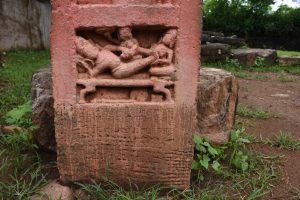INIG1182 Chait Inscription of VS 1182
INIG1182 Chait (Gwalior). On a pillar. 6 lines, old nāgarī, Sanskrit. Mentions some Jaina worthies; only the name Vijayasena is legible.
INIG1177a Indor Inscription of VS 1177

Indor (District Guna). Hero-stone pillar inscription of VS 1177 (INIG1177a)
INIG1162 Kadwāhā Inscription of VS 1162
INIG1162 śrāvaṇa śudi 5 ravivāra Kadwāhā (Guna). In a temple (number 3). 5 lines, nāgarī, Hindi. Damaged; some names of ācāryas are recorded.
INIG1152 Dubkund Inscription of VS 1152
INIG1152 vaiśākha śudi 5 Dubkund (Sheopur). On the base of pādukā in a Jaina temple. 4 lines, nāgarī, Sanskrit. Mentions double pādukā of Kāṣṭhasaṁgha mahācāryavarya śrī Devasena.
INIG1150 Gowalior Fort Inscription of VS 1150
INIG1150 Gwalior fort (Gwalior). Two slabs in the porch of the Sās Bahū temple. 22 lines (right side) + 21 lines (left side), old nāgarī, Sanskrit. Describes the construction of and donations to Padmanātha (i.e. Viṣṇu) by the Kacchapaghāta ruler Mahīpāladeva. The main kings of the Kacchapaghāta dynasty are given in the inscription as: Lakṣmaṇa and his son Vajradāman (who defeated the king of Kannauj and conquered Gopādri); Maṅgalarāja; Kīrtirāja and his son Mūladeva (known as Bhuvanapāla and Trailokyamalla) who married Devavṛttā; his son Padmapāla; his heir Sūryapāla and his son Mahīpāla Bhuvanaikamalla who was a brother of Padmapāla. Composed by Maṇikaṇṭa, son of Govinda and the grandson of Rāma; written by Digambara Yaśodeva and inscribed by Padma Siṁhavāja and Māhula, sons of Devasvāmin.
INIG1138 Kadwāhā Inscription of VS 1138
INIG1138 Kadwāhā (Guna). On a loose slab in the ruins of the maṭha. 4 lines, nāgarī, Hindi. Broken and not legible.
INIG1134 Kadwāhā Inscription of VS 1134
INIG1134 āśvina 2 guruvāra Kadwāhā (Guna).On a slab in a temple. 1 line, nāgarī, Hindi. Records only the year and day.
INIG1132a Pachrāi Inscription of VS 1132a
INIG1132a Pachrāi (Shivpuri). On a pillar in one of the Jaina temples. 6 lines, nāgarī, corrupt Sanskrit. The inscription is broken.
INIG1124 Lakhārī Inscription of VS 1124
INIG1124 Lakhārī (Guna). From a step well. 6 lines, nāgarī, corrupt Sanskrit. Mentions a grant of 200 siddhidramma by Jahlaṇadevī, wife of rājaputra Candrāditya in the time of mahārājādirāja Abha[ya]deva. Now in Archaeological Museum, Gwalior.
INIG1122 Pachrāi Inscription of VS 1122
INIG1122 Pachrāi (Shivpuri). On slab in a shrine of Śāntinātha. 8 lines, nāgarī, corrupt Sanskrit. Mentions one Harirāja and his son Raṇamāla (i.e. Raṇapāla). Begins with a verse in praise of Śāntinātha; refers to Bālacaṁdra, the disciple of Subhanaṁdi belonging to Kuṁdakuṁdasaṁtāna and Deśikagaṇa. Mentions the ruler Raṇapāla and his forbears Harirāja and Bhīma. Gives the genealogy of a person named Maheśvara belonging to Parapāṭānvaya. His son was [De]vi and his son was Rājana, who is stated to have made the kīrtti. At end mentions two goṣṭhikas one of which was Jasahaḍa.